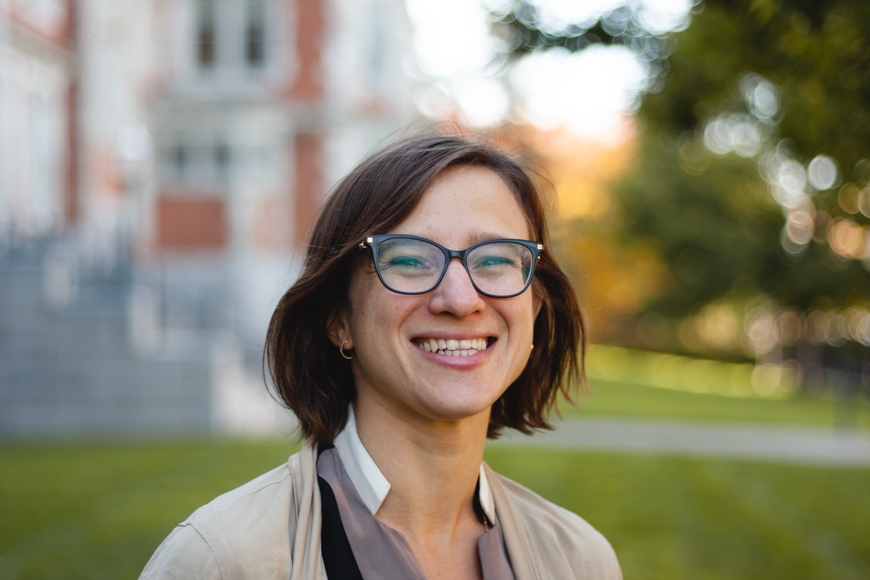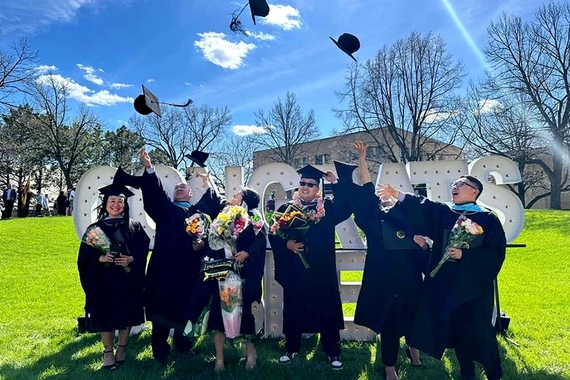A Common Thread: Using Literature to Connect Larger Ideas
Oil, feminism, minorities, and genies. All of these are topics that will be covered by new Asian and Middle Eastern studies Professor Shir Alon this year.
For Alon, her work ties to her background in comparative literature. Alon’s unique vantage as a trilingual professor—speaking Arabic, Hebrew, and English—means that she forges connections across languages, disciplines, and subjects. “The benefit of literature is that it gives us a platform to question a lot of our basic structures of thinking...and it keeps suggesting new connections,” she says.
Finding Connections
Alon’s research on Hebrew and Arabic literature found a long history of literary and cultural exchange. “There is this assumption that Arabs and Jews have been enemies from time immemorial,” Alon explains. “The way I enter this debate is by showing how the modern histories of Arabic and Hebrew are more similar than we think.”
Amidst the histories of violence in the Middle East, Alon centers literature in her research. “We see these interesting parallels in how Arab and Hebrew writers respond to the demands and challenges of modernity, including the challenge of writing a literature that would even be considered ‘modern,’” Alon says. Both cultures have shared traumatic histories that include forced partitions, migrations, and expansion—all of which have significantly shaped the region. The literature that Alon studies is grounded in these histories of Arab and Hebrew culture, but her research as a whole focuses on using literature to connect larger ideas.
The histories of Arab and Hebrew cultures are at the core of what Alon does, but she does not solely focus on them.
Alon’s background in comparative literature allows her to teach a wide range of subject matter, while still connecting them back to Arabic and Hebrew literature. The interdisciplinary aspect of her teaching is something she enjoys, as drawing upon different areas of study ties into her passion of finding connections across cultures and fields.
“I feel that literature provides us with tools and metaphors to think about our social and political life in ways that are incredibly powerful and illuminating,” Alon says. Understanding how these different ways of thinking interact with each other is at the core of Alon’s work and research.
Centering the Middle East and Asia
Alon’s first year at the University comes with the change of the department name from Asian Languages and Literatures to Asian and Middle Eastern Studies (AMES). She describes the name change as reflecting one of two primary strengths the department has. “The connections between Asia and the Middle East, surprisingly enough, are not often explored,” she explains. “I’ve already seen unusual comparative conversations taking place in the department about global processes, like capitalism and colonialism, as they shape different cultures across the continent.” These conversations demonstrate the unique connections that can be formed by pairing together Asia and the Middle East. This combination sets the department apart from others of its kind.
Bringing people who study different geographic regions of Asia and the Middle East together enables a shift from Eurocentric approaches to centering Asian and Middle Eastern points of view. “A new perspective allows us to see new connections, to think of things in new ways,” she elaborates.
The second strength is the focus on humanist inquiry. Alon traces the creation of area studies departments back to the Cold War era’s view of eastern countries. The AMES department focuses on culture, literature, media, and language studies to “subvert the underlying notion of the East as an easily identifiable object, studied and analyzed by the West.” The department highlights political, cultural, and intellectual movements in Asia and the Middle East, which is “crucial in dismantling modes of empire thinking that are at the background of this area of study,” Alon says.
Onward
Alon is thrilled to be starting at the University of Minnesota. She taught Arab Feminism and Minoritization: Middle East and South Asia in fall 2019, and will teach courses on American and Middle Eastern Petrofictions and on Genies, Ghosts, and Demons in Arabic Literature (“Jinn Stories”) in spring 2020. She looks forward to teaching her classes this upcoming year, and as always, identifying unexpected connections between them.



